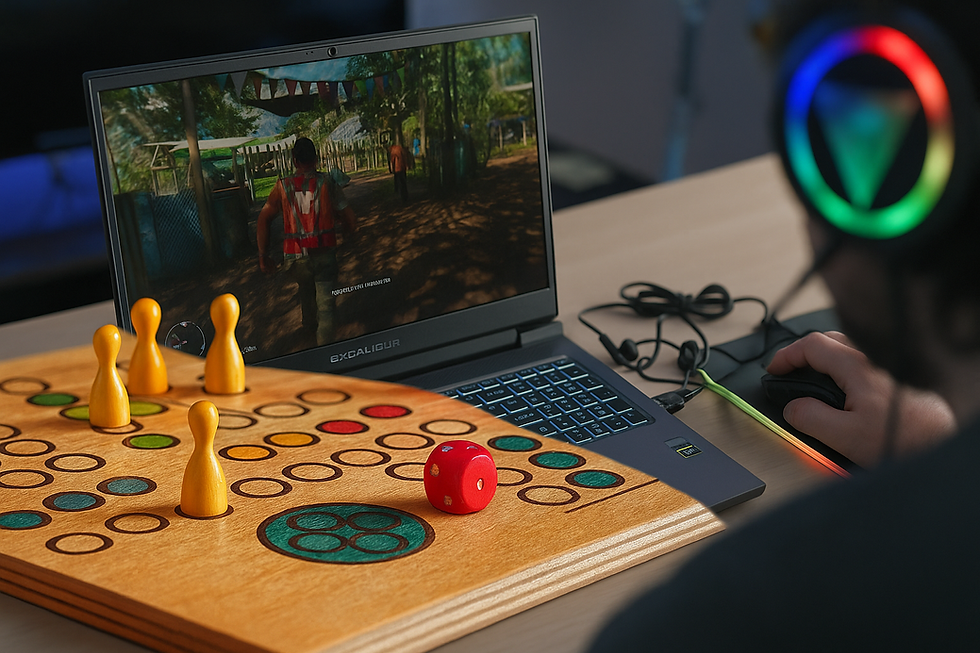Top 5 Brain-Boosting Board Games for Kids That Make Learning Fun
- shahmeerarshad008
- Aug 21, 2025
- 4 min read
Table of Contents
1. Introduction: Why Kids Need Brain-Boosting Games
Children today are surrounded by technology, fast entertainment, and short attention spans. While tablets and apps have their place, research shows that board games can significantly enhance memory, focus, and problem-solving skills in children. Unlike passive screen time, board games require kids to think, plan, and interact with others—turning play into an opportunity for growth.
This is where brain-boosting board games for kids play an important role. They combine fun with learning, helping children strengthen cognitive abilities while bonding with family and friends.
2. What Makes a Game Brain-Boosting?
Not all games are created equal. A brain-boosting game should:
Enhance memory (remembering moves, strategies, or sequences).
Develop critical thinking (planning ahead, predicting opponents’ moves).
Encourage problem-solving (finding creative solutions in tough positions).
Build patience and focus (waiting for turns, sticking with longer games).
Promote social interaction (teaching teamwork, negotiation, and communication).
Games that check these boxes don’t just entertain kids—they act as mini brain workouts.
3. Benefits of Board Games for Child Brain Development
Studies in child psychology show that board games improve executive function skills, which are key to academic success. Some benefits include:
Boosting memory and recall
Improving focus and attention span
Encouraging logical reasoning
Enhancing creativity and imagination
Building resilience by teaching kids how to lose gracefully
Parents often notice that kids who regularly play educational board games develop sharper problem-solving skills in school and improved confidence in decision-making.

4. Top 5 Brain-Boosting Board Games for Kids
4.1 Chess: The King of Strategy
Chess is widely known as the ultimate brain game. It teaches kids:
Strategic planning
Patience
Pattern recognition
Problem-solving under pressure
Research shows that kids who play chess regularly perform better in math and critical thinking tasks. And since chess can be started with simple rules, even a 6-year-old can enjoy it while gradually mastering complex strategies.
4.2 Go: Ancient Game of Endless Possibilities
Go is one of the world’s oldest board games, played for over 2,500 years. Despite having just a few simple rules, the possibilities are endless. Playing Go improves:
Spatial reasoning
Long-term strategic thinking
Concentration and patience
Although traditionally more popular in East Asia, Go is gaining recognition worldwide as an excellent tool for training young minds.
4.3 Checkers: Simple Rules, Sharp Thinking
Checkers may look simple, but it requires foresight and tactical awareness. Kids learn:
Quick decision-making
Pattern recognition
Forward planning
It’s an accessible game for younger children who might find chess too complicated but still want to train their thinking.
4.4 Othello (Reversi): Easy to Learn, Hard to Master
Othello is often described as a game where “a minute to learn, a lifetime to master.” Kids practice:
Flexible thinking (adapting strategies mid-game)
Prediction (anticipating how the board will change)
Problem-solving under uncertainty
Its short playtime makes it great for keeping children engaged while still challenging their minds.
4.5 Nine Men’s Morris: A Forgotten Classic for Kids
This ancient game from the Roman era deserves a comeback in modern homes. It’s easy for kids to learn yet full of strategy. Nine Men’s Morris teaches:
Logical sequencing
Planning attacks and defenses
Critical decision-making
Its historical value also makes it a fun way for children to learn about ancient cultures while boosting their brains.
5. How Parents Can Turn Playtime into Learning Time
Parents play a vital role in making board games more educational. Some tips include:
Ask questions: “Why did you make that move?” helps kids think aloud.
Encourage reflection: Discuss what worked and what didn’t after a game.
Mix it up: Rotate between different board games to train different skills.
Make it family time: Shared play encourages bonding and communication.
When guided positively, playtime becomes both fun and intellectually stimulating.
6. The Future of Brain-Boosting Games (Digital + Physical)
The world of brain-boosting board games for kids is evolving. While traditional boards remain timeless, new innovations blend the physical and digital worlds.
Modern solutions, like rollable digital game boards, combine dozens of strategy games in one device. They keep the tactile feel of board games while adding interactivity and accessibility. Kids get the best of both worlds—hands-on play and smart technology.
This hybrid trend ensures that the benefits of strategy gaming remain relevant in a digital-first world.
7. Conclusion: Building Smarter Kids Through Play
In today’s world, where distractions are everywhere, helping kids focus and think critically is more important than ever. Brain-boosting board games for kids like Chess, Go, and Othello aren’t just entertainment—they are mental workouts that sharpen young minds.
And as families look for ways to combine learning with fun, solutions like Pixply, a digital rollable gaming board with classic and global strategy games, point to an exciting future. By bringing together tradition and innovation, it ensures that kids can enjoy both the fun of play and the benefits of lifelong learning.



Comments